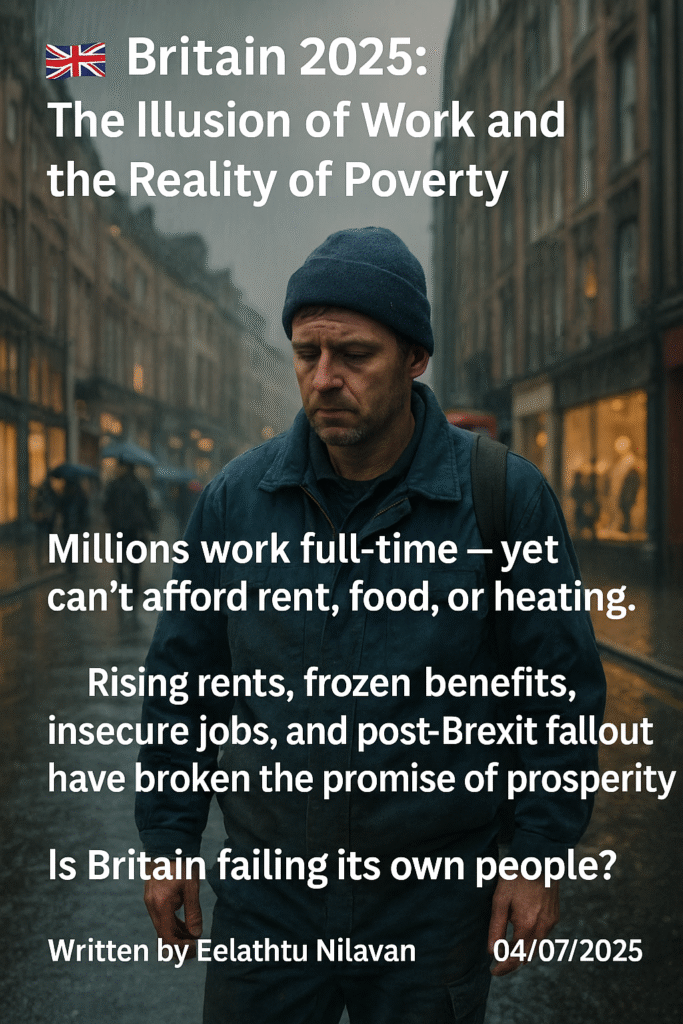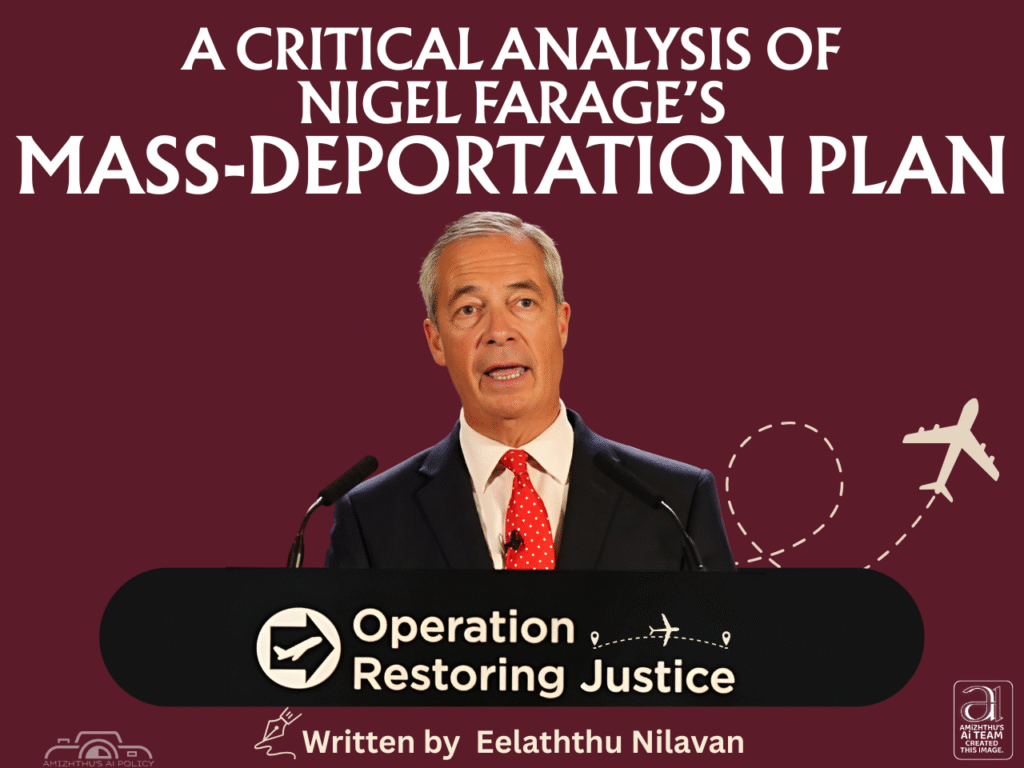
✧.Introduction
In the United Kingdom of 2025, millions of people clock in for work every morning, complete full-time hours, and still find themselves trapped in poverty. The historic belief that hard work guarantees a decent standard of living is eroding, not due to a lack of ambition or effort, but because the socioeconomic system appears increasingly rigged against the working class.

This article explores the mechanisms that broke the link between work and security in Britain. We uncover how rising living costs, insecure employment, stagnating wages, frozen benefits, and the aftershocks of Brexit have combined into a perfect storm of economic injustice. Through data, testimonies, and geographic analysis, we ask the urgent question: Is Britain failing its own people?
✦. The Rise of In-Work Poverty
❖ What Is In-Work Poverty?
In-work poverty refers to individuals or families who earn an income through employment but still do not make enough to cover basic living expenses. This includes housing, food, energy, transportation, and healthcare.
▣. In 2025, over 4.3 million workers in the UK are classified as in-work poor — a 12% increase since 2020.
▣. Children in working households now make up over 65% of child poverty statistics.
▣. Food bank use has surged among those with full-time jobs, especially key workers like nurses, drivers, and retail staff.
❖ Why Is Work No Longer Enough?
Several systemic changes have contributed:
▣. Real wages (adjusted for inflation) have stagnated or declined.
▣. The National Living Wage has failed to keep pace with living costs.
▣. The growth of part-time, gig economy, and zero-hour contracts has reduced employment security.
▣. Many jobs no longer provide pensions, paid sick leave, or long-term contracts.
✦. Housing Crisis: Renters on the Brink
The UK’s housing crisis is one of the primary forces driving working poverty.
▣. In cities like London, Manchester, and Bristol, average rents now consume over 50% of a worker’s income.
▣. In 2024-25, the average UK private rent increased by 9.5%, while wages rose only 2.8%.
▣. The number of people in full-time work but relying on temporary accommodation or living in vans has sharply increased.
The loss of social housing, the rise of property speculation, and landlord-friendly policies have made stable, affordable housing a rarity for workers.
✦. Frozen Benefits and a Fractured Safety Net
The welfare system, once a source of support during tough times, is no longer serving its protective function.
▣. Universal Credit benefits have been frozen or reduced in real terms since 2021.
▣. Sanctions and delays in payments push working claimants deeper into debt.
▣. Even full-time workers are relying on Universal Credit top-ups, food banks, or family help to survive.
Meanwhile, disabled individuals, single parents, and ethnic minorities face disproportionately high levels of poverty and are more likely to be penalized by the benefit system.
✦. The Geography of Working Poverty
❖ North-South Divide
▣. The North of England, including areas like Blackburn, Hull, and Middlesbrough, has the highest rates of in-work poverty.
▣. Many former industrial towns have suffered from underinvestment, job losses, and deindustrialization.
❖ London and the South East
▣. While incomes are higher in London, so are living costs — especially housing and transportation.
▣. Working poverty is now rising fastest in London, driven by skyrocketing rents and insecure service-sector jobs.
❖ Rural Poverty
▣. In areas like Cornwall, Cumbria, and Wales, tourism-based economies and seasonal work make year-round stability difficult.
▣. Poor public transport and a lack of childcare further trap workers in low-pay roles.
✦. Post-Brexit Economic Instability
❖ Supply Chain Disruption
▣. Post-Brexit tariffs and border checks have raised the prices of food, medicines, and raw materials.
▣. This inflation, compounded by global shocks, is not matched by wage growth.
❖ Labour Market Chaos
▣. Many EU nationals who left Britain post-Brexit were never replaced, leading to chronic staff shortages.
▣. Employers fill gaps with underpaid, overworked staff, reducing bargaining power and wages for workers.
✦. Rise of Insecure Work and the Gig Economy
❖ Zero-Hour and Gig Jobs
▣. Delivery drivers, cleaners, and carers increasingly work on zero-hour contracts.
▣. Lack of holiday pay, pension rights, or sick leave leaves workers vulnerable.
❖ Platform Work
▣. Apps like Deliveroo and Uber provide “flexibility” at the cost of security.
▣. In reality, many gig workers earn below minimum wage after expenses.
✦. Voices From the Edge: Testimonies of the Working Poor
▣. Sophia, 29, a nurse in Birmingham: “I work nights, but I still can’t afford childcare or rent. My salary disappears by the second week.”
▣. James, 42, a delivery driver in Bristol: “I do 60+ hours a week but can’t get a mortgage. I live in my van.”
▣. Aliyah, 35, a single mother in Manchester: “Universal Credit delays left me with no heating for 3 weeks last winter. I work, but it’s never enough.”
✦. Political Inaction or Policy Failure?
Critics argue that successive UK governments have neglected structural inequality:
▣. Tax breaks for the wealthy have increased the wealth gap.
▣. The failure to build affordable housing has worsened homelessness.
▣. Lack of collective bargaining power and weakened unions have reduced wage security.
Though policymakers promise “Levelling Up,” many in struggling regions have yet to see meaningful change.
✦. Is Britain Failing Its People?
This is no longer a rhetorical question. When full-time work can’t provide a roof, food, and stability, the social contract is broken. Britain, one of the richest nations on Earth, is leaving millions behind in poverty, not because they don’t work hard, but because the system no longer rewards that work fairly.
✧.Conclusion:
The Britain of 2025 is a nation of contradictions. On one hand, it boasts a thriving tech sector, billionaire wealth, and global cultural influence. On the other, it struggles to provide dignity to the very workers who keep it running. Poverty is no longer the fate of the idle — it’s the punishment for working in a system stacked against the poor.
For a better future, Britain must:
◉ Raise the minimum wage in line with living costs.
◉ Regulate rents and build affordable housing.
◉ Invest in secure, high-quality public jobs.
◉ Fix the broken welfare system and expand universal services.
◉ Strengthen worker protections and union rights.
Only then can the nation reclaim the belief that hard work should lead to security, not struggle.
Disclaimer – The information in this article is for educational and informational purposes only. It is not intended as financial, legal, or investment advice. While every effort has been made to ensure accuracy, we do not accept responsibility for errors or omissions. Readers must take any action based on this article at their own risk.
Written by Eelaththu Nilavan | 04/07/2025
The views expressed in this article are the author’s own and do not necessarily reflect Amizhthu’s editorial stance.
MORE FROM AUTHOR –










